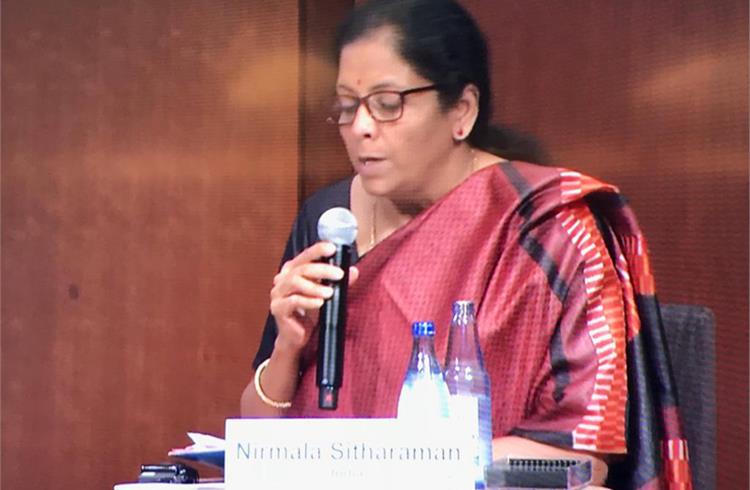"Policy measures needed to lower TCO of EVs," says India’s Finance Minister
Tabling the Economic Survey 2018-19 in Parliament today, the Union Minister for Finance, Nirmala Sitharaman EV affordability vital to make them an attractive alternative to conventional vehicles.
The government of India seems to be working on several reforms and policy measures to make higher adoption of electric vehicles (EVs) in the country a reality. Tabling the Economic Survey 2018-19 in Parliament today, the Union Minister for Finance, Nirmala Sitharaman said that the Survey find that EVs hold enormous potential for India not only because they are eco-friendly but also as an opportunity for the country to emerge as an EV manufacturing hub, generating employment and growth opportunities.
The survey says it “may not be unrealistic to visualise one of the Indian cities emerging as the Detroit of EVs in the future”. However, it adds that “appropriate policy measures are needed to lower the overall lifetime ownership costs of EVs and make them an attractive alternative to conventional vehicles for all consumers”.
The study cites the Ministry of Environment, Forest & Climate Change (2018), which says that in India, the transport sector is the second largest contributor to CO2 emissions after the industrial sector. What's more, road transport accounts for around 90 percent of the total emissions in the transport sector in India. It further noted that the market share of EVs increases with the increasing availability of charging infrastructure, “It, therefore, becomes important that adequate charging stations are made available throughout the road networks.”
Universal charging standard for EVs in India
Access to fast-charging facilities must be fostered to increase market share of EVs, the survey added. “In India, the limited availability of charging infrastructure seems to be a major impediment to increased adoption of EVs.”
Another major impediment is that of time taken for completely charging EVs compared to conventional vehicles. The Survey says, “It is, therefore, an important policy issue to come up with universal charging standards for the country as a whole to enable increased investment in creation of such infrastructure.”
“It is equally important to provide information on public charger to the users of EVs through online maps and other means such as physical signage. This will encourage increased ease of adoption of EVs.”
The study also pushes the cause of indigenous battery development, “The development of appropriate battery technologies that can function efficiently in the high temperature conditions in India need to be given utmost importance (NITI Aayog 2018)”.
Attributing NITI Aayog, the Economic Survey estimates that if India reaches an EV sales penetration of 30 percent for private cars, 70 percent for commercial cars, 40 percent for buses and 80 percent for two- and three-wheelers by 2030, a saving of 846 million tonnes of net CO2 emissions and oil savings of 474 MTOE can be achieved. It also provides India an opportunity to grow as a manufacturing hub for EVs provided policies are supportive.
RELATED ARTICLES
Bosch hydrogen engine tech-powered truck to be on Indian roads this year
The global supplier of technology and services is betting big on both electromobility and hydrogen. While announcing the...
IIT Bombay inaugurates Arun Firodia Research Floor
IIT Bombay, one of India’s top technical and research institutions, honours Kinetic Group chairman Dr Arun Firodia, one ...
Maruti Suzuki expands capacity at Manesar plant by additional 100,000 units
New assembly line at Plant A expands total manufacturing capacity at the Manesar plants to 900,000 units per annum. Alon...





 By Autocar Pro News Desk
By Autocar Pro News Desk
 04 Jul 2019
04 Jul 2019
 7188 Views
7188 Views









